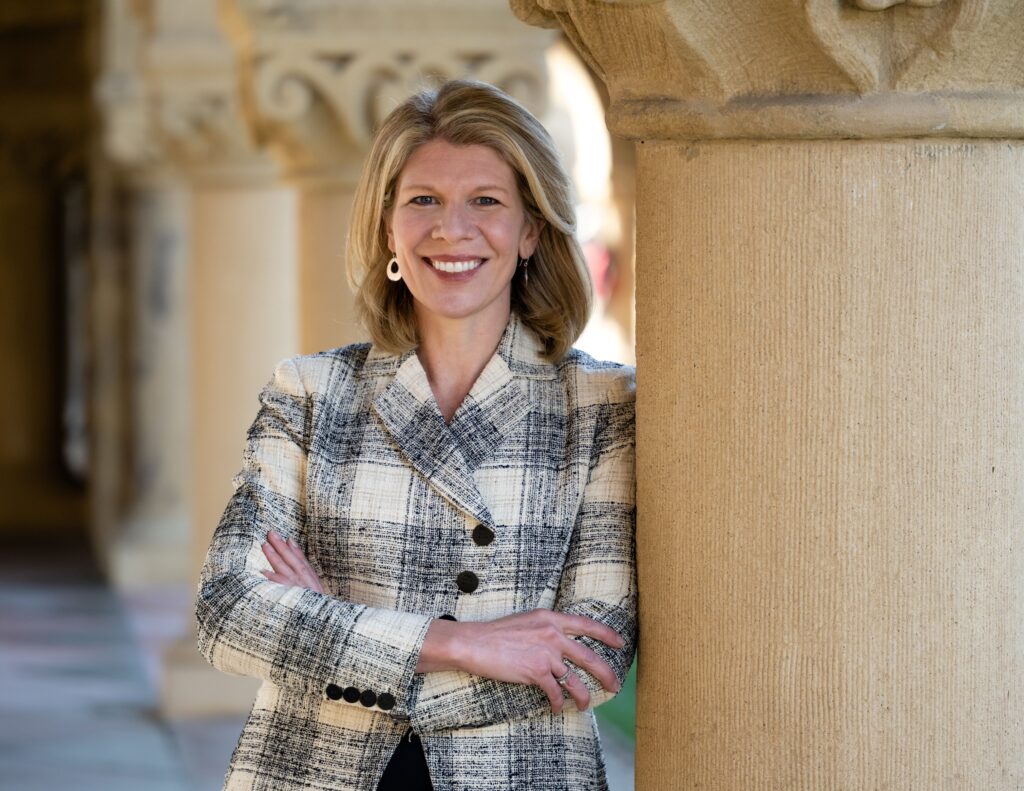SLS’s Nora Freeman Engstrom Honored with Prosser Award for Outstanding Contributions to Tort Law
The Association of American Law Schools’ (AALS) Section on Torts and Compensation has named Stanford Law School (SLS) Professor Nora Freeman Engstrom, JD ’02, the winner of the 2025 Prosser Award. Named in honor of William L. Prosser, author of the seminal treatise on tort law, the award recognizes lifetime contributions to scholarship, teaching and service in the field of tort law. Engstrom will receive the Prosser Award at the annual AALS meeting in January 2025.
Engstrom, 49, Ernest W. McFarland Professor of Law, is believed to be the youngest winner of the Prosser Award since the award’s inception in 1974. Past honorees include Boston University School of Law Professor Fleming James, federal judge and former Yale Law School Dean Guido Calabresi, retired federal judge and renowned legal scholar Richard Posner, and SLS’s Robert L. Rabin, the A. Calder Mackay Professor of Law.

Engstrom is a nationally recognized expert in tort law and legal ethics and has played a leading role in clarifying, modernizing, and advancing tort law in the United States. She has authored numerous award-winning articles, is the author or co-author of three casebooks, including the classic tort law casebook Tort Law and Alternatives, and is the past Chair of the AALS Section on Torts and Compensation Systems.
Engstrom also co-directs SLS’s Deborah L. Rhode Center on the Legal Profession, the premier academic Center in the United States devoted to making the civil justice system more equitable, accessible, and transparent.
Since 2019, she has served as an American Law Institute (ALI) Reporter for two Third Restatement of Torts projects: the Miscellaneous Provisions project, as well as the Medical Malpractice project. In 2022, the ALI awarded Engstrom the R. Ammi Cutter Reporter’s Chair for her outstanding work as a Reporter.
“The Prosser Award highlights the fundamental importance of tort law to our justice system and to the promotion of fairness and responsibility throughout society,” Engstrom said. “Tort law reinforces the principle that no one is above the law, and everyone has a right to their day in court.”
Engstrom continued: “Winning the Prosser Award has special resonance for me because the roster of past recipients includes so many of my heroes, mentors, and friends. Even being mentioned in the same breath as such luminaries as Ken Abraham, Guido Calabresi, Mike Green, Richard Posner, Judge Jack Weinstein, and my mentor and dear friend, Bob Rabin, is thrilling and humbling. All are people I have long revered.”
Rabin, who received the Prosser Award in 2008, said Engstrom “truly fits the bill” for an award designed to honor a torts professor “who has contributed singularly distinguished service to the torts community.”
“From the beginning of her academic career, she has authored one illuminating article after another, ranging from the internal dynamics of the tort system in action to superb doctrinal studies of cutting-edge issues,” Rabin said. “All of this in combination with her outstanding teaching skills and distinctive, institutional work refining and refocusing the field of accident law. From a personal perspective, she is a gem to have as a colleague, co-author, and co-teacher.”
Mike Green, a Washington University School of Law visiting professor and winner of the Prosser Award in 2015, said: “Nora has contributed monumentally to our understanding of tort law and compensation systems. She has subjected a variety of subjects to her deep research, keen analytical mind, and elegant writing. Her work on the Third Restatement of Torts will benefit courts, lawyers, and academics for decades to come. She is also a delightful colleague to work with and a hero to her students.”
About Stanford Law School
Stanford Law School is one of the nation’s leading institutions for legal scholarship and education. Its alumni are among the most influential decision makers in law, politics, business, and high technology. Faculty members argue before the Supreme Court, testify before Congress, produce outstanding legal scholarship and empirical analysis, and contribute regularly to the nation’s press as legal and policy experts. Stanford Law School has established a model for legal education that provides rigorous interdisciplinary training, hands-on experience, global perspective and focus on public service, spearheading a movement for change.
